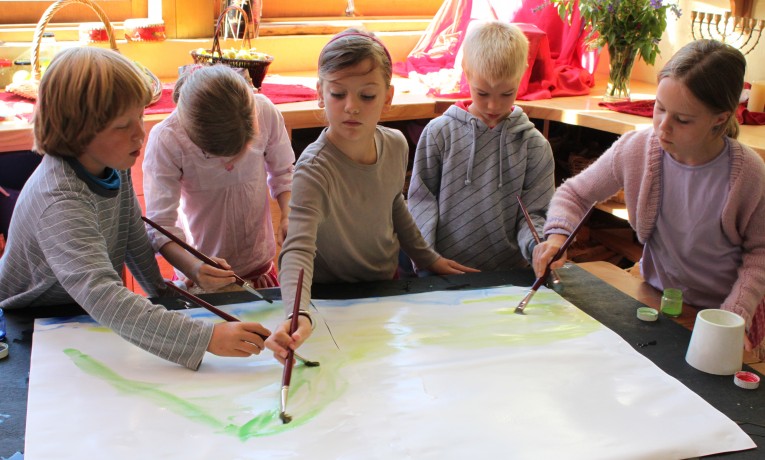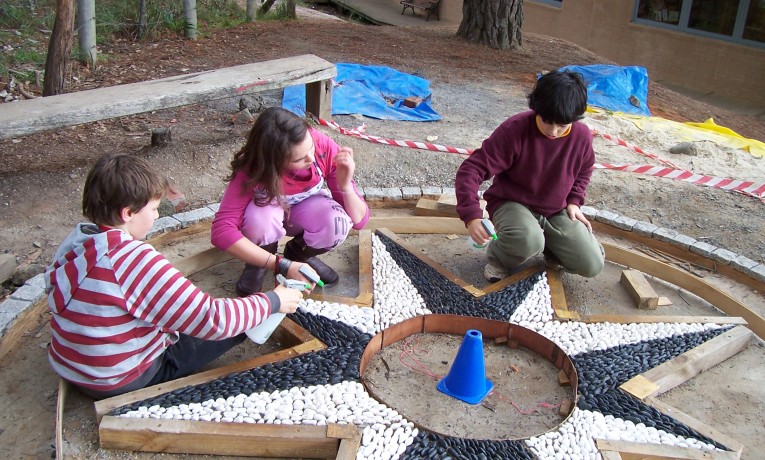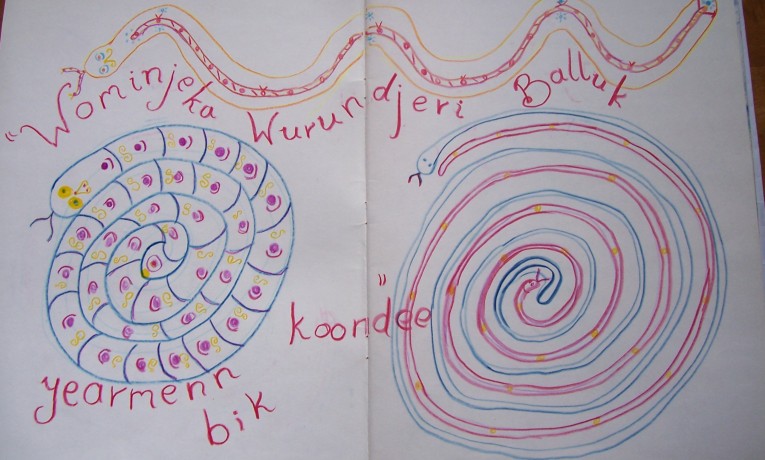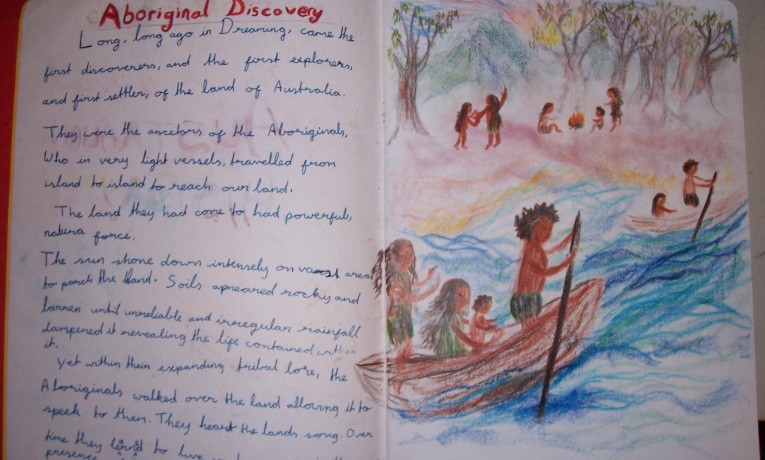…In our class ‘communities’ and in our curriculum, we try to bring a little of the whole world…
Class one to class eight forms a journey and a complete curriculum. A class teacher, with whom the children form an intimate bond, guides the class throughout, assisted by specialist teachers.
The journey of a child through the class teacher period takes place in a warm community, in a beautiful natural environment and with the continuity of relationship of the class teacher. Surrounded by these pillars each child can find her/himself within the world.
Class teacher subjects include-
Art
The development of artistic sensitivity is explored through all subjects. Art activities are integrated in all lesson content, helping to deepen children’s experience. Painting, drawing and clay modelling as illustration and exploration of lesson content accompanies all subjects.
Painting with watercolour gives opportunity for the class teacher to observe the child’s temperament. Through this clear fluid medium children experience the qualities and interactions of colour, inspiring deep feeling impressions.
Comprehension of form and its gestures is developed through the movement sensation of form drawing. These studies are deeply therapeutic. Later, objective drawing is also explored, leading to perspective drawing in class 7 and studies in tonal shading in class eight.
Children are shown great art works as they are related to lesson content.
Craft – Textiles and Woodwork
..The more we take into account that intellect develops from the movement of the limbs, from dexterity, the better our education will be… living thinking is externalised movement..
Thinking and understanding arise out of movement. Practical work harmonises children, working down into the life processes and bodily rhythms. Craft has a crucial role to play in our curriculum. Rhythmic handwork strengthens both the will and the capacity for logical thinking. Formative aesthetic experiences in colour and texture provide foundations for future feelings, imagination and inclinations.
Employing a progression of materials and skills, expert mentors join the junior classes to offer diverse projects in textiles and woodwork, providing the basis for future work.
Drama
Drama is an integral part of the literacy curriculum. The children’s first reader is often their first performed play. From puppet plays in Kindergarten to solo performances in year 12, the school provides a sequenced experience of Drama, hosting a play production involving the whole class every year. Plays are chosen to elaborate the epoch studies at any year level, advancing students’ love and respect for language and performance and developing appreciation for the capacities and strengths of each class member.
English
Language is the primary medium of education and we aim to cultivate language skills in all subjects and settings.
Words express some of the inner nature of what they describe. For literacy to be an active, living activity, the class teacher’s imaginative oral presentation is crucial. Practising speech, listening, recitation, gesture, drama, debate and discussion all require an inner dynamic and movement and are formative. The class teacher engages the imagination through powerful stories from great cultural traditions. Frequently the teacher tells the stories rather than reading from books.
Speaking and listening, spelling and grammar, writing and reading are practised in a sequential and imaginative context, using artistic means to help embody learning. Punctuation, direct and indirect speech are introduced. In later classes creative writing emphasizes simile, metaphor and creating interest through phrases and clauses. The strict forms of poetry are explored including classic styles and non western influence such as haiku. Letter writing and report writing are also learned.
Older children prepare reports and short talks, and have some exposure to the notion and rules of debates. This develops the ability to listen and understand from other points of view. Spelling and word development continues, including looking at English from Latin.
By class six regular classroom writing and reading includes games, dictation, use of the dictionary, sentence construction. The children study a text in class and contribute to written and oral interpretation. The daily reading of their own selected material and regular reports to the teacher and class about books read all form part of class 6 English. The teacher reads literature to the class and provides opportunities for regular choral speaking and reciting of selected poems.
Eurythmy
Eurythmy is movement embodying archetypal gestures representing spoken sounds, both consonants and vowels, as well as tones of musical scales and intervals. In this work the inner movement that gives rise to speech is transformed and externalised in the form of outer movement.
Eurythmy shapes and educates the body as a means for expression and is a core component of our curriculum. A performing art, it also has deep educational and therapeutic aspects.
Applied appropriately at different ages, Eurythmy is taught on a weekly basis to support and strengthen classwork through increased balance, poise, grace and concentration.
Gardening
Throughout primary school, and especially in class seven when each student is given their own block to work, the children visit and revisit the school farm to garden. Nothing beats plucking an apple straight from the tree and chomping into its crisp sweetness. The farm provides an opportunity to smell grass, feel damp earth, turn a clod, take home an onion.
Agriculture is the foundation of modern civilization. Such is the significance of farming – with its attendant life lessons – that it is essential for children to have direct experience with it. One of the main attractions, somewhere between the beehives and the mudbricks (or in his old truck or halfway up a ladder), is Farmer Pete, with always a job to do, a problem to solve, an carrot to eat or a plough that needs pushing.
A wealth of sense impressions, an affinity with the seasons, new skills and sense of one’s strength, practical knowledge of our food, of the way all parts in nature contribute to the whole – all this contributes to a firm sense of standing on the earth.
Geography
The study of Geography is a voyage of discovery, leading us to increased awareness of our environment, waking us up to an increased awareness of space itself and human activity of all kinds, in an increasing circle. How does my awareness of my environment affect my experience and my actions? In Geography we study the phenomena of the earth and human influence on the environment.
In early years this is taught in a unity with other subjects, with the aim of getting to know and feel connected with ones’ surroundings and the work people do.
From class four we widen our horizon and Geography is named as a separate subject, including environmental studies, cultural studies, simple astronomy, geology and the study of human beings, plants and animals.
History
We study the past to discover the evolution of consciousness at different times in different cultures in different places, comparing those with our own. The future also belongs to History and the ideals we carry are an expression of our potential, as they carry the impulse for change.
An integrated study in early years, History is called a separate subject in Class 5. The Ancient cultures of India, Persia, Mesopotamia and Egypt are explored in myth and fact. China, Meso and South America could be added. This is followed by Greek culture and Homer’s Epic.
In class six the children meet Alexander the Great through biography, his explorations and conquests. Roman History is brought to life through looking at its foundations and the development of the Roman Empire. Of considerable interest are the lifestyles and customs of ancient Rome, including their smooth roads, flushing loos, impressive bridges and aqueducts, and of course, the beginnings of Democracy.
In class six we study Australian history and the early settlement of Australia, Sydney and the explorations which led to the establishment of other cities. The children are given a taste of good old folk songs and bush ballads, accompanied by the short stories of Lawson and poetry by the likes of Banjo Patterson. The infectious melody and spirit of Australian bush music often culminates in a family bush dance where children of all ages strip the willow and swing their partners (and not necessarily in that order).
Languages other than English
Foreign language studies foster a positive attitude to people of other cultures and generally establish our ability to empathize with another person’s way of seeing the world. Learning a foreign language strengthens our ability to listen sensitively to another person and supports flexible, mobile thinking. We offer French and German and native speakers join the class teacher to engage in a range of practical and artistic activities, focusing on giving the child an ‘ear’ for the language.
Vocabulary, comprehension and classroom interaction are extended upon during class five language study.
Maths
Mathematics is taught through both main lessons and regular practice. Artistic and practical activities deepen the child’s experience from abstraction to deeply felt somatic experience. Maths externalises inner processes of growth and change. In geometry use of the compass to find radius, diameter and perimeter are studied – as are bisecting a line, constructions within the circle, and the fascinating spiral forms arising from arithmetic and geometric progression. The use of colour reveals the inner geometry of these forms. In a journey through the junior school students are introduced to equivalent fractions, decimals and long multiplication, percentage, interest, discount and compound interest. Area is studied through the square, the rectangle and the Theorem of Pythagoras. Pattern is introduced as Ratio and Proportion, via the Fibonacci Series and exploration of Spiral forms.
Tables and patterns, four processes, factors, fraction, decimals and estimating are all introduced. Thorough knowledge and continued practice of these maintain confidence. Problem solving is encouraged with increasing emphasis on possible solutions. Puzzles and number squares are also incorporated with the intent of developing clear and lateral thinking.
Music
An education of the listening ear – music is offered as an integral aspect of our school life from Kindergarten to Year 12, in special and in everyday ways, in classes, at assembly, festival or celebration.
Music is an enormous part of everyday life at school. It involves singing – often spontaneously, while painting or packing up or whittling… – as well as movement with and to music. The recorder repertoire expands in class two, with the learning method continuing to be an activity of imitation and repetition.
Active immersion in musical substance, experience through practice of its nature, progressive, step by step awakening to musical principles and finally proceeding to a basis of knowledge based on direct experience – these are aims of the Steiner School curriculum.
A sequential experience of music includes singing, daily recorder practice, string instrument lessons and string orchestra. The children have a weekly half hour instrument lesson and class orchestra rehearsal. Music is a vital and prominent feature of daily school life. Children in class six may elect to participate in a music camp combining with students from other schools and culminating in a day of performance, usually during the school holidays. By class six the children have had the opportunity to perform for family, friends and peers. Indeed some of them have developed the performance bug! There are often opportunities for the orchestra to perform – at the school open day, for example – to the general public. Festivals and celebrations always incorporate music, singing, sharing and celebrating through rhythm and ritual and involve all age groups.
… .The child finds that he or she is important to the whole, while at the same time realizing that all the others are equally important…
Solo instruments such as piano or guitar may also be taken up in class 6 or 7.
Outdoor Education
From class three on children participate in a range of camp experiences in which increasing independence is required. From the homely and simple first camp, where parents share in cooking and activities until the adventurous camps of senior classes, students are offered a wonderful range of landscapes and activities that expand their sense of what is possible, increase their awareness of the natural world, and offer opportunities for sharing company, food, skills and play.
Children camp in tents and increasingly share in cooking. Each year provides a different focus such as walking, swimming, sailing or bicycling. The camps are run by our outstanding outdoor education staff.
Class five children attend a camp, which is usually to the Grampians, where they are involved in all aspects of daily life including preparing shelter and food, caring for self and others and, most importantly, having fun.
Class six children spend five glorious days sailing the high seas. Often accompanied by dolphins or old salt sea shanty types, they learn the skills and craft of sailing a wind powered boat.
Physical Education
Beginning with games, skipping, clapping, throwing and catching, activities integrated into the main lesson period, children progress to more formal movement education led by specialists in the gym. Games provide opportunities for courage and caution, individual and group challenges. Separating, interacting and joining again highlight the importance of relationships and their moral basis, facilitated by the ‘rules of the game’. Bothmer gymnastics provide opportunities to develop balance, uprightness and clarity of form. The ideals of gymnastics include striving for truth, beauty and goodness.
Sciences – Physics, Biology, Chemistry
Scientific investigation of the world begins when a child gains an ability to see the world causally, and studies serve to cultivate this thinking faculty. We begin with simple and homely examples, with the sensitive vision of an artist and an appreciation for the order, form and beauty of nature.
The study of materials and life processes are part of an integrated curriculum in the early years. The emphasis is on observation rather than theory. Care is taken to preserve the children’s natural awe for the mysteries they discover in the natural world and in human cultural achievements.
Life sciences are brought imaginatively in the early years, through consideration of the seasons, the rhythms of sun, moon and earth, celebrated artistically through festivals. Transformation is introduced through literature, through the farming main lesson, through creation stories. From class 4 more accurate detail is accompanied by a sense for the gesture and character of plant, animal, human being. Health and nutrition draw on the children’s own observation.
The nature of materials is introduced in class 6, but experienced in all ways in all years! In class 6 sound, light , magnetic and electrical phenomena are considered. There’s exciting exploration to be done in physics, exploring the Phenomena of Sound through Pythagoras and musical intervals. And a certain excitement is palpable when the class six room blacks out its windows to study the concept of Light – the colour spectrum and qualities of darkness and light (it’s not quite the old ‘wink murder’ party game, although much squinting is undertaken!).
Support education.
It is recognized that there are children who need extra support in order to be able to participate fully in the class programs. Each child who comes for special assistance is unique and therefore has an individual program designed. Usually, until class three, the child’s needs can be assessed and catered for by the class teacher, though younger children can be fitted into the remedial program if the class teacher requests it.
The school is aware of the needs of some children for support over a range of areas of development – physical, social, artistic, and intellectual covering language and numeracy.
We recognize that often with encouragement and greater self esteem comes more positive and successful participation in both academic and social aspects of school life.
Children’s progress and development are monitored by the special education teacher through regular sessions and appropriate follow up tests. At all levels there is consultation between support staff and class/ subject teachers. Comments by the student and by parents are also part of the assessment picture. Communications are always open.
Assistance is offered in Language and Numeracy/ Maths. Movement exercises are given to develop self awareness, spatial awareness and a sense of rhythm. Painting and form drawing tasks may be offered.
The Extra Lesson
Not a formal part of the Melbourne Rudolf Steiner School, but an adjunct to our education and one that some of our students find to be hugely beneficial, the Extra Lesson is an assessment, diagnosis and remediation program originally developed by Audrey McAllen, and based on the paradigm of Rudolf Steiner’s education of the child.
The aim of the Extra Lesson assessment is to illuminate any developmental delays which may impede the child’s learning. The resultant diagnosis is used to formulate an individual remedial program, which will assist in overcoming these developmental delays.
The Extra Lesson provides assistance in the areas of physical / spatial orientation, brain orientation, self awareness and emotional growth.
The work of the extra lesson is done through a series of exercises that are presented as games and activities, through the mediums of movement, rhythmic and co ordination exercises, drawing and painting.





